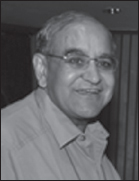Translate this page into:
Obituary
Corresponding Author:
Naveen Kumar Channaveerachari
Department of Psychiatry, National Institute of Mental Health and Neurosciences, Bengaluru, Karnataka
India
naveen.nimhans@gmail.com
| How to cite this article: Channaveerachari NK. Obituary. Natl Med J India 2018;31:241 |
Ravi Shankar Pandey
(1 July 1951–1 July 2018)

A TEACHER EXTRAORDINAIRE
Professor (Dr) Ravi Shankar Pandey was a towering presence at the National Institute of Mental Health and Neurosciences (NIMHANS), Bengaluru. His sudden demise was deeply unsettling, and the fraternity needed some time to come to terms with the loss. This is particularly true for his many students, colleagues, friends and acquaintances who had worked with him closely over the decades.
He was a psychiatrist who invoked reverence, wonder and respect with his unparalleled knowledge not only in psychiatry but also on a range of subjects. He had an extraordinary ability to recall facts precisely from the sources read years back. He was a detached teacher. He developed a close friendship with few people throughout his life but had a deep emotional bonding with those who were his friends. However, his knowledge had an overarching effect on all those who came in his contact. In addition, he had a droll sense of humour and sarcasm. He was extremely upright and fearless, who fought for whatever issues he thought were right.
Professor Pandey’s entry into the medical world was not aspirational as he was interested in mathematics, but his father had other plans and wished he pursued Medicine. Accordingly, he completed MBBS with distinction from the King George’s Medical College, Lucknow. After that, Professor Pandey took up a couple of other specialties for postgraduation before settling down with psychiatry. He did his senior residency at the Post Graduate Institute of Medical Education and Research, Chandigarh, before he joined NIMHANS, Bengaluru, as a faculty. Here, he spent the rest of his professional life (albeit for a brief period at the Institute of Human Behaviour and Allied Sciences, Delhi). Professor Pandey took voluntary retirement from service (as Professor of Psychiatry, NIMHANS) on 30 April 2015. After that, he was leading a contented life with his family consisting of his wife (Dr Rani Acharya) and son (Mr Abhishek Pandey).
Professor Pandey’s inspiring approach to teaching is perhaps his biggest contribution to the fraternity. He was an idealist in whatever he taught. He used to teach for hours on end without fatigue. His preparation before teaching was out of the ordinary. He used to cover every possible aspect of the topic before imparting wisdom to students. Another aspect was that he used to go back, read, clarify the confusing aspects, and without fail, made it a point to explain those the next day. His command and mastery over the subject was such that he would be the last word in academic discussions. Those who would contradict, without proper preparation, had their ignorance exposed in the most humorous and sarcastic ways. However, not many knew a particular aspect of his persona. If his views were disagreed upon with logical reasoning, he would gladly accept the other viewpoint. He loved using blackboard for teaching. At the end of his departmental academic programmes, he would give us a complete understanding of the matter like no other. His thoughts and speech flowed freely when he used the blackboard. His seminars had jam-packed audiences spanning faculty members to students. Many of his students have gone on to hold illustrious positions in their careers, such as Professor Gangadhar B.N. (Director, NIMHANS, Bengaluru), Professor K. Srinivasan (Head, Division of Mental Health and Neurosciences, St John’s Research Institute, Bengaluru) and Professor Pradeep Sharma (S.M. S. Medical College, Jaipur).
He had particular devotion in treating doctors (who had psychiatric disorders) or their relatives. The moment he came to know that the patient is a doctor; he would volunteer to see them personally, without having to wait for the junior/senior resident. He followed this principle till the end. Professor Pandey had an abiding interest in Biological Psychiatry; his research publications such as his paper on ‘autoimmune model of schizophrenia’ are a testimony to this. Another example of his brilliance found a place in the American Journal of Psychiatry in which he (and his coauthors) showed that fusaric acid decreased the patient’s manic symptoms and that the symptoms approximately reverted to their previous state when a placebo was reinstituted. The demonstration of a relationship between depression and Wilson disease and the desirability and possible superiority of short-acting lithium preparations over the slow-release preparations are other examples of his contributions. However, Professor Pandey cut short his research career quite early and dedicated his entire career to teaching and clinical work.
Professor (Dr) Ravi Shankar Pandey lived life (both professional and personal) fearlessly, on his own terms, and was a contented and happy individual. He leaves behind a legacy which is difficult to replace in the near future.
Fulltext Views
2,042
PDF downloads
1,486




